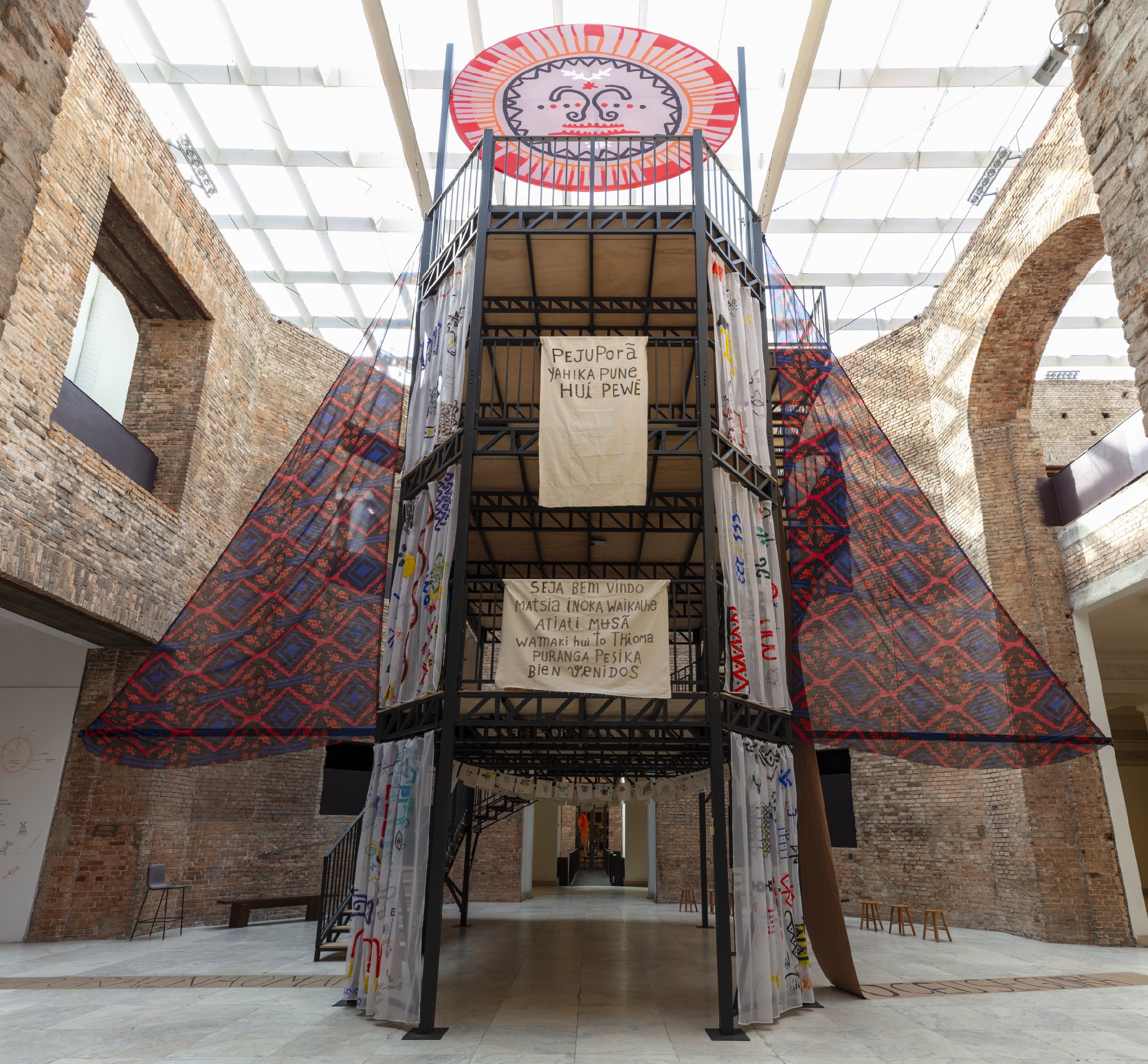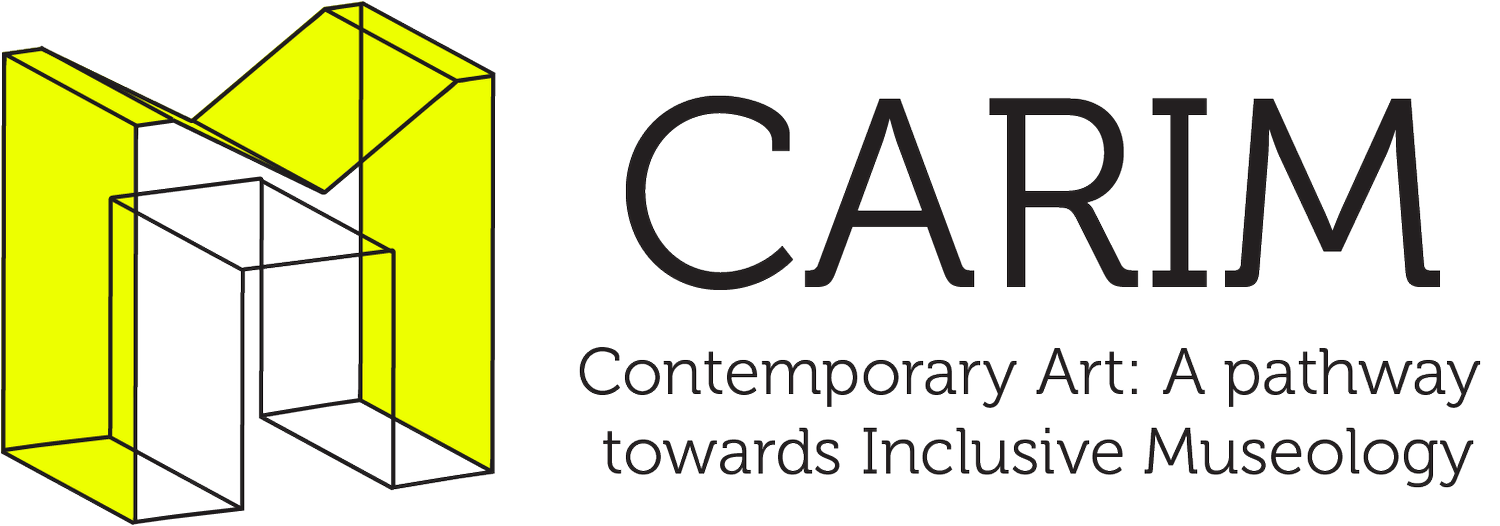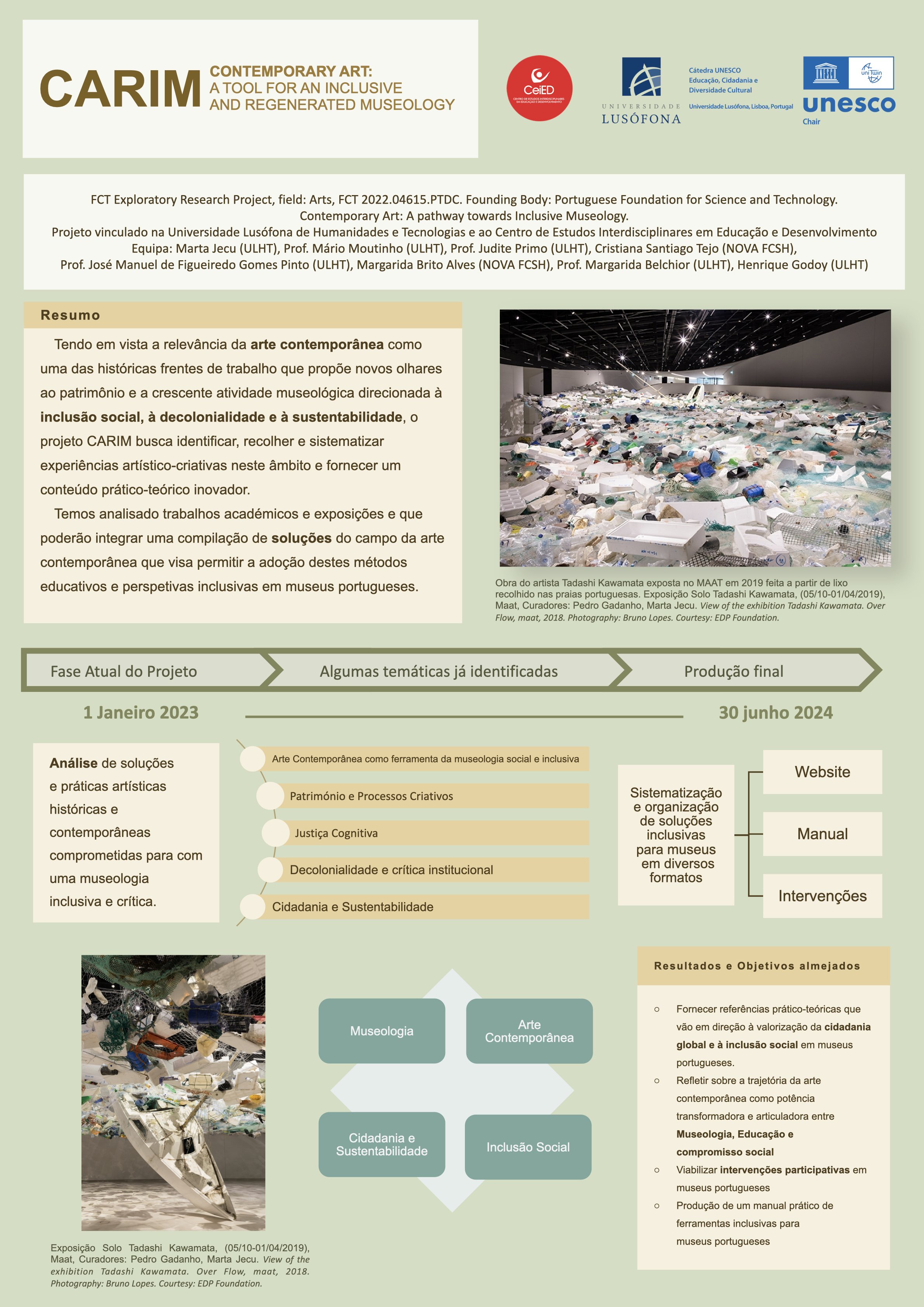
Comunicações em Encontros Nacionais: :
Margarida Brito : «Imagens entre tempos» – apresentada na XII Conferência Internacional de Cinema de Viana, realizada no âmbito dos XXIII Encontros de Cinema de Viana, organizada pela Escola Superior de Educação de Viana do Castelo, Viana do Castelo, 3 de Maio de 2023. Keynote da sessão inaugural
Jecu, M. (2023): Carim FCT Research Project (Poster presentation). Ciência 2023: Encontro com a ciência e a tecnologia em Portugal (5-7 July 2023), Campus Universitário de Santiago, Aveiro. Organização: Fundação para a Ciência e Tecnologia; Ciência Viva; Universidade de Aveiro
Jecu, M. (2023): Carim FCT Research Project , 13th Research Encounter, Ceied, Universidade Lusofona.
Comunicações em Encontros Internacionais: :
Jecu, M. (2023). Exodus Stations – A Research and Curatorial Project. (Lecture) HeritageDot conference, Lincoln University, UK (May 2023).
Jecu, M. (2024) (Chair, organisation, moderation). International Symposium Carim,. Museum of Aljube. Resistance and Liberty, Lisbon, Portugal (July 2024)
Jecu, M. (2023). Carim Project. (Lecture) Minom meeting, Catania, Sicilia.
Jecu, M. (2024). Carim FCT Project: Contemporary Art a Tool for Inclusive Museology. (Lecture) MINOM International conference,Catania, Sicily (February 2024).
(extra) José Gomes Pinto (Keynote Speaker), Instrumentos de Identidad y repetición: medios de geolocalización mnemónica y estética. Ciclo de Estética y Tecnología. Universidad de Salamanca, Facultad de Filosofía, Grupo de Estética y Teoría de las Artes, 23 de Novembro de 2023. Conferência produzida no âmbito do projecto FCT Carim FCT 2022.04615.PTDC.
(extra) Margarida Brito Alves «Túlia Saldanha: Inside and Outside the Box – apresentada no Simpósio ‘Challenging the Narrative: Conservation and Replication of Immersive Artworks’ organizado pela Haus der Kunst / Munich e o Getty Conservation Institute, na Haus der Kunst, Munique, 11 de Novembro de 2023. - dar origem ao artigo nos Cadernos
Ciafrino, Arantxa (2024). Conferência no XI Ciclo de Palestras sobre Políticas Culturais e Museológicas, atividade de apoio à disciplina Museologia V do Curso de Museologia Integral, da UNIRIO
Organização de seminarios e conferencias internacionais:
Organização de conferencia internacional Museu do Aljube: 3rd Julho 2024
Seminário com Ana Catarina Pinho em dialogo com Margarida Brito Alves e Christiana Tejo na Galeria NowHere, Lisboa (27 de setembro às 18:00h)

Lecture
Jecu, M. (2024). Carim Project. International MINOM Conference 2024, Catania, Sicilia, IT.
Date: Feburary 2024
Venue: Catania, Italy
Abstract:
This oral communication proposes a reflection on the scientific content produced by the project 'Contemporary Art - A Tool for an Inclusive and Regenerated Museology' (financed by the Portuguese Foundation of Science and Technology in 2023) and coordinated by me. The project is interdisciplinary situated at the crosspoint of theory of arts, artistic practice and is dedicated to innovative and effective methodologies in museology, elaborated with the means of contemporary art, specifically with conceptual art. The project aims to demonstrate that the history and tradition of conceptual art was an important tool of institutional critique that delivered from the beginning of the 20th century until today new display solutions that contributed to challenging the Euro-centric orientation of the discipline and introduced inclusive, critical, anti-hegemonic and de-colonial museologic solutions. While these movements started in the art museum (during the 20th century), they progressively spread towards other branches of museology, affecting material culture museums (natural history, ethnology museums).
Interdisciplinary, my oral communication will be blending theory from: heritage studies (Taylor&Gibson 2017; Dudley 2020), anthropology (Foster 1995; Clifford 1997; Ingold 2007), conceptual and visual arts (Goldie and Schellekens 2010; Newman and Bird 1999) and decolonial studies and museology (Witcomb and Message 2020; Cass, Park, Powell 2020, Fowles 2016). Especially Sociomuseology provides the path to approach these artistic practices, which elaborate a decolonial pedagogy and participatory outputs (Primo & Moutinho 2020, 2021). My oral communication aims to show that conceptual art provided solutions for sociomuseologic objectives: inclusive historical narratives, interactive heritage, museum as a site for social intervention, challenging the transmission of certitudes.
I will also analyse a few case-studies, developed during the research project: participatory, interactive, critical and inclusive interventions in material culture museums with the means of conceptual art.
I would be extremely happy to have the chance to be part of this MINOM gathering. Often academic projects in extremely competitive contests, remain nevertheless without echo, therefore an exchange with fellow professionals is highly beneficial.
Lecture
Ciafrino, A. (2024). A dança contemporânea como uma ferramenta para a decolonização de espaços museológicos e as ameaças da instrumentalização da crítica institucional. International MINOM Conference 2024, Catania, Sicilia, IT.
Date: Feburary 2024
Venue: Catania, Italy
Abstract:
Em várias capitais europeias, museus têm gradualmente adotado a dança contemporânea e a performance em suas programações e coleções como meio de abordar questões relacionadas ao colonialismo e à decolonização. Esse movimento desafia a abordagem tradicional dos museus, historicamente centrados em objetos, ao considerar a dança e a performance como forma artística e prática decolonial. A medida que a discussão em torno a conceitos como a reparação simbólica e a herança colonial cresce, museus em toda a Europa com coleções provenientes de contextos coloniais estão descobrindo nas artes performáticas novas maneiras de repensar suas coleções e oferecer perspectivas renovadas por meio dessas expressões artísticas. Nesse contexto, o projeto "Moving the Forum", um projeto de dança contemporânea visando a decolonização realizado pelo Museu Humboldt Forum na Alemanha, será objeto de estudo desta pesquisa. Este estudo enfatiza a dança contemporânea e a performance como ferramentas para refletir e implementar a decolonização nos espaços museológicos, ao incorporar narrativas críticas, corpos dissidentes e vozes historicamente silenciadas em seus programas. No âmbito da Sociomuseologia, esse trabalho investigativo busca contribuir para uma reflexão crítica sobre projetos de dança contemporânea e performance em capitais europeias que abordam a decolonização, buscando compreender até que ponto museus poderiam estar a se apropriar de uma terminologia decolonial como uma forma de instrumentalização da crítica institucional, culminando num enfraquecimento de seu potencial político e transformador. A Museologia Decolonial, a Museologia Social e a Sociomuseologia requerem uma abordagem crítica e criativa para desenvolver e pensar práticas museais que desafiem o paradigma tradicional centrado em objetos, oferecendo novas perspectivas sobre a transmissão do conhecimento e o encontro de pessoas com diferentes culturas, saberes, mitos e tradições.
This presentation and the publishing of the article were completed while holding a scholarship for the project: CARIM. Contemporary Art: A pathway towards Inclusive Museology. [FCT Exploratory Research Project, field: Arts, [FCT 2022.04615.PTDC, DOI 10.54499/2022.04615.PTDC]
Lecture
José Gomes Pinto (Keynote Speaker), Instrumentos de Identidad y repetición: medios de geolocalización mnemónica y estética. Ciclo de Estética y Tecnología. Universidad de Salamanca, Facultad de Filosofía, Grupo de Estética y Teoría de las Artes. Conferência produzida no âmbito do projecto FCT Carim FCT 2022.04615.PTDC.
Date: 23rd November 2023
Venue: Salamanca University, Spain
Lecture
Margarida Brito Alves (Invited Speaker) «Túlia Saldanha: Inside and Outside the Box – apresentada no Simpósio ‘Challenging the Narrative: Conservation and Replication of Immersive Artworks’ organizado pela Haus der Kunst / Munich e o Getty Conservation Institute, na Haus der Kunst, Munique.
Date: 11th November 2023
Venue: Haus der Kunst, Munich, Germany
Background Image: 'Escola Panapaná' from Denilson Baniwa at Pinacoteca de São Paulo in 2023.
Credits: Isabella Matheus – Reproduction Pinacoteca de São Paulo

ANA CATARINA PINHO: WAYS OF SEEING Ana Catarina Pinho: Ways of Seeing. Ways of Exhibiting
Date : 27th September 2023 at 18h
Venue : Galeria NowHere, Lisbon, Portugal
Web : https://www.nowhere-lisboa.com/expo-proj
This communication has as its starting point the exhibition “O Império da Ficção” (curated by Ana Catarina Pinho, MEIAC, 2022) which explores the fictional layers of the iconographic construction of the Portuguese colonial empire, while simultaneously identifying the role that technical images play in the perception of reality. Through the work of five contemporary Portuguese artists, this exhibition questions the imperial legacy by looking at issues invoked by the images, and exposing the fabrication of narratives that supported the construction of nationalist ideologies, still latent in the collective unconscious. With the aim of reflecting upon the representation of historical events and the production of new relations between image, history and memory as well as archive, discourse and representation. This exhibition serves as a conceptual proposal to fill the gaps of cultural heritage that is as difficult as it is complex, thus demonstrating the importance of a critical approach to the images of the past, as a way of responding to the urgencies of the present.
Lecture: Ana Catarina Pinho, followed by a talk between:
Margarida Brito Alves, Paula Lobo e Ana Catarina Pinho.
Ana Catarina Pinho
Licensed in Arts em (ESAP, 2006), MA in Photography and Documentary Cinema(IPP, 2010). In 2022 defended her PhD thesis, carried out in the European Centre for Documentary Research (eCDR), in University of South Wales, United Kingdom, supported with a scholarship by FCT. In her investigation she edited the book “Reframing the Archive” (Archivo Press, 2021), and curated “The Empire of Fiction” exhibition (MEIAC, 2022).
Image Credits: Galeria NowHere
Background Image: 'Escola Panapaná' from Denilson Baniwa at Pinacoteca de São Paulo in 2023.
Credits: Isabella Matheus – Reproduction Pinacoteca de São Paulo

Lecture:
Jecu, M. (2023): CARIM FCT Research Project , 13th Research Encounter, Ceied, Universidade Lusofona.
Project presentation
Date : 21st July 2023
Venue : 13th Research Encounter, Ceied, Lusofona University, Lisbon
Web : https://www.ceied.ulusofona.pt/en/13th-ceied-researchers-meeting/
Background Image: 'Escola Panapaná' from Denilson Baniwa at Pinacoteca de São Paulo in 2023.
Credits: Isabella Matheus – Reproduction Pinacoteca de São Paulo
Poster presentation:
Jecu, M. (2023): Carim FCT Research Project. Ciência 2023: Encontro com a ciência e a tecnologia em Portugal (5-7 July 2023), Campus Universitário de Santiago, Aveiro. Organização: Fundação para a Ciência e Tecnologia; Ciência Viva; Universidade de Aveiro
Date : 5-7 July 2023
Venue : Encontro com a ciência e a tecnologia em Portugal (2023), Campus Universitário de Santiago, Aveiro. Organisation: Fundação para a Ciência e Tecnologia; Ciência Viva; Universidade de Aveiro
Web : https://www.encontrociencia.pt/2023
Lecture:
Alves, M. B. (2023) «Imagens entre tempos» – Presented in the XII International Conference of Cinema of Viana do Castelo. Carried out in the XXIII Meeting of Cinema of Cinema de Viana. Organized by the Escola Superior de Educação de Viana do Castelo. Viana do Castelo, Portugal.
Date: 3rd of May 2023
Abstract
Assuming the articulation between space, time and image in contemporary artistic production as a central reflection axis, this communication aims to look into different processes of image construction and discussing the latencies and strengths that are part of an image. Therefore, starting off from the spatialization of the arts, and in particular images, problematizing the different temporalities that they are associated with, there will be taken into consideration some practices that help up questioning and even reconfigure the relation we have with the world we live in.

Lecture:
Jecu, M. (2023). Exodus Stations: A Research and Curatorial Project. HeritageDot conference, Lincoln University, UK.
Date : 22nd March 2023
Venue : HeritageDot conference, Lincoln University, UK.
Web : https://heritagedot.org/2023-parallel-sessions-5/
Abstract
My presentation will will make a demonstration of my research and curatorial project EXODUS STATIONS (WWW.EXODUSSTATIONS.COM) (since 2017 ongoing). This project is a platform that enables professional contemporary artists to work on the digital photographic archives of museums of material culture and publish the results online. Exodus Stations is based on a research on the photographic digital archives of the museum, the mediation of this content to artists, that are granted access to the digital archives and the development of an interpretative artistic work, that is problematising these archives. The results are than promoted via digital means to the large audience. The project is focused on museums with collections of material culture (ethnology, natural history, anthropology) and aims to introduce with digital means innovatory display solutions and creative new ways to understand, present and revitalise historic objects, by working with their digital documentation (photographic archives).
My presentation will will make a demonstration of my research and curatorial project EXODUS STATIONS (WWW.EXODUSSTATIONS.COM) (since 2017 ongoing). This project is a platform that enables professional contemporary artists to work on the digital photographic archives of museums of material culture and publish the results online. Exodus Stations is based on a research on the photographic digital archives of the museum, the mediation of this content to artists, that are granted access to the digital archives and the development of an interpretative artistic work, that is problematising these archives.
The project is focused on museums with collections of material culture (ethnology, natural history, anthropology) and aims to introduce with digital means innovatory display solutions and creative new ways to understand, present and revitalise historic objects, by working with their digital documentation (photographic archives).
The projects took so far place in six major European Museums:
Museu Carlos Machado in Azores Island, Portugal; Museum Iwalewahaus Bayreuth, Germany;
Center of Arts José de Guimaraes; Ciajg, Guimarães, Portugal; Musée Quai Branly, Paris, France; Mucem Museum, Marseille, France; Museum of the Romanian Peasant Bucharest, Romania and Centre Pompidou Paris, France.
The results are promoted via digital means to the large audience, which has a following benefits:
Promoting digital visual heritage stored in museums' archive – a heritage that is rarley accessible to the large audience.
Interprete this heritage through a contemporary lens, embed it into contemporary creation and promote it via cultural networks.
Develop creative responses to and engagement with museologic heritage, new types of relationships between pats and present and reintroduce the past into circulation into a contemporary artistic context.
Through digital archiving and communication, contemporary artistic practice adds value to this museologic heritage, which ends up reaching a wider and more varied audience.
There has been a huge leap forward in terms of digital engagement as a consequence of the pandemic – from participants and users, to memory institutions hastening the production of digital content – yet there remains an enormous and widening digital divide. Building on the theme of partnerships, it is relevant to consider how co-creation can help to bridge this divide.
This project aims to present and systematise a repertoire of methods of artistic work with digital archives. Museums can be always inspired for finding new ways of creatively expanding the communication of their heritage through artistic practice. The project adresses both the educational and communication departments of museums, but also the artistic community. It aims to inspire and encourage artists to look into museologic heritage and to work with digital archives as a visual information full of potentiality. The project addresses also the large audience, calling for a creative, critical and personal appropriation of heritage and visual archives.
Background Image: 'Escola Panapaná' from Denilson Baniwa at Pinacoteca de São Paulo in 2023.
Credits: Isabella Matheus – Reproduction Pinacoteca de São Paulo






